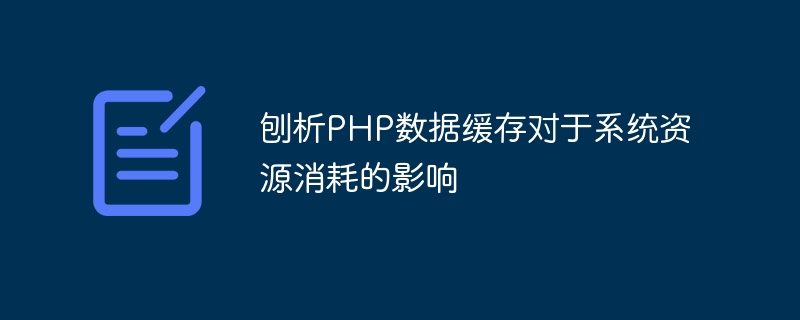

Analysis of the impact of PHP data caching on system resource consumption
Overview
In Web development, data caching is an important topic. It can significantly improve the performance and responsiveness of your system. This article will focus on data caching in PHP and analyze its impact on system resource consumption.
Types of PHP data cache
In PHP, common data cache types include memory cache and file cache. Memory caching refers to storing data in the server's memory to increase the speed of data reading. File caching stores data on the hard disk so that it can be easily read when needed.
Sample code for memory caching
The following is an example of PHP code using memory caching:
<?php
// 连接内存缓存服务器
$memcached = new Memcached();
$memcached->addServer('localhost', 11211);
// 检查缓存中是否存在数据
$key = 'example_key';
$data = $memcached->get($key);
if ($data === false) {
// 如果缓存中没有数据,从数据库或其他数据源读取数据
$data = getDataFromDatabase();
// 将数据存储到缓存中,有效期为1小时
$memcached->set($key, $data, time() + 3600);
}
// 使用数据进行后续操作
processData($data);Sample code for file caching
The following is an example of PHP code using file caching :
<?php
// 检查缓存文件是否存在
$cacheFile = 'example_cache.txt';
if (file_exists($cacheFile)) {
// 检查缓存文件是否在有效期内
$cacheTime = filemtime($cacheFile);
$currentTime = time();
$expireTime = $cacheTime + 3600; // 缓存有效期为1小时
if ($currentTime < $expireTime) {
// 如果缓存文件在有效期内,直接读取缓存数据
$data = file_get_contents($cacheFile);
} else {
// 如果缓存文件已过期,重新从数据库或其他数据源读取数据
$data = getDataFromDatabase();
// 将数据写入缓存文件
file_put_contents($cacheFile, $data);
}
} else {
// 如果缓存文件不存在,从数据库或其他数据源读取数据,并写入缓存文件
$data = getDataFromDatabase();
file_put_contents($cacheFile, $data);
}
// 使用数据进行后续操作
processData($data);The impact of data cache on system resource consumption
When using data cache, you need to pay attention to the following points on the impact of system resource consumption:
Conclusion
Data caching plays an important role in improving system performance and response speed. However, it must be used with caution and the appropriate caching scheme selected for the specific situation. In actual applications, we need to comprehensively consider system requirements, server resources and data characteristics to achieve the best balance of performance and resource consumption.
Reference materials:
The above is the detailed content of Analyze the impact of PHP data caching on system resource consumption. For more information, please follow other related articles on the PHP Chinese website!




